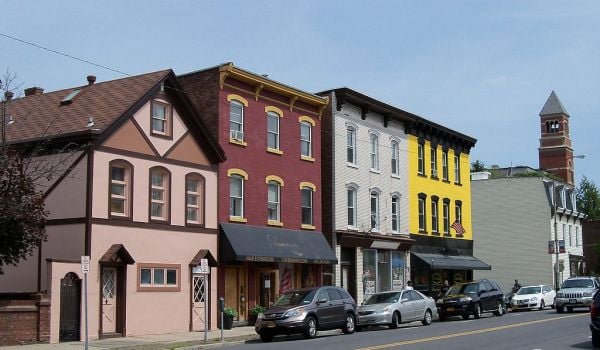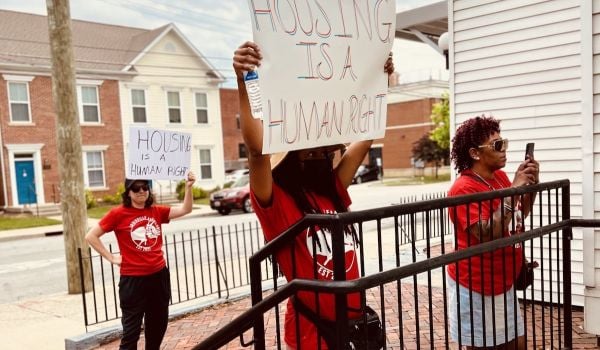New York State’s Budget Fails to Provide Vouchers for Unhoused New Yorkers
In New York, Governor Kathy Hochul’s $220 billion budget has passed. According to City Limits, the budget left many advocates for affordable housing dismayed because it dropped a $250 million housing voucher program for homeless residents that had been included in a previous budget version. Advocates say it could help house 20,000 people across the state. The vouchers are meant for people experiencing homelessness and at risk of eviction. Despite being approved by both houses of the legislature and being supported by advocates and landlords, the governor’s office dismissed the funding, claiming that it would cost $6 billion, according to New York Focus. But the budget ask was capped at $250 million, leaving advocates baffled.
A renewal of a controversial tax break that has mostly allowed developers to build above market rate housing was left out of budget negotiations and will be negotiated over the coming months. The tax break requires developers to include a percentage of “affordable” units in new developments, but those affordable units were still not affordable to low-income New Yorkers. A proposal from the governor to replace the program with one that mandated more affordability was not much of an improvement, according to a report from ANHD. Fortunately, the budget does add $800 million to the state’s Emergency Rental Assistance Program, which was initially funded through federal covid relief. It also adds $250 million to pay pandemic-related utility debts and another $125 million for landlords whose tenants did not request ERAP funds. The need for assistance is high because the governor allowed the state’s eviction moratorium to elapse, and eviction cases in housing court are overwhelming lawyers in the city’s Right to Counsel program.
NYC Council Bills for Social Housing Introduced
Councilmember Carlina Rivera introduced multiple bills today intended to advance social housing at the city level. The first bill, the Community Opportunity to Purchase Act, is a new version of a citywide bill that was introduced last year but failed to make it to vote. The bill would mandate that landlords selling a residential building alert the Department of Housing Preservation and Development (HPD) and offer first chance of purchase to a list of nonprofit housing providers. The purpose of the legislation is to keep housing affordable and in nonprofit and community control. It could supplement the statewide Tenant Opportunity to Purchase Act (TOPA), which offers similar privileges to tenant associations. Another bill would remove the requirement for Community Land Trusts to advertise their available units in the city’s affordable housing website. This is a legal requirement for most other affordable housing units in the city, but advocates say it is both time-consuming and expensive and can lead to long vacancies. In a series of articles last February, I looked at how San Francisco’s social housing initiative, the Small Sites Program, was hampered by vacancies, which advocates attributed in part to similar requirements.
Another bill would require HPD to keep a list of vacant apartment units, inspect 15% of said units and supply a list of their conditions to the city council. According to Councilmember Rivera’s office, the legislation is meant to address the practice of landlords intentionally leaving units unoccupied in the hopes that leaks, mold and other maintenance issues will force low-income neighbors to vacate.
Also in NYC: Mayor Adams announced that the city will no longer deposit money from city agencies into Wells Fargo, following investigations in Bloomberg and The City showing that the bank was disproportionately denying refinancing requests from Black homeowners.
S.F. Tenants Organize Under “Right to Organize” Ordinance
A San Francisco ordinance that went into effect on April 11 allows tenants to form a union that landlords must bargain with in good faith. The first union formed under the legislation consists of tenants of San Francisco’s largest private landlord, and they have officially asked to be recognized by their landlord Veritas, according to Capital and Main. Tenants represent 15 separate buildings owned by Veritas. They have been negotiating with Veritas as a tenant association for years to get pandemic debt waived. Capital and Main also reports that tenants have sued Veritas multiple times for tenant harassment. In January, the union ended a five-month rent strike with concessions from the landlord to cancel existing rent debt and to bargain further on so-called “shadow debt,” third-party debt accrued by tenants in order to pay rent. But Veritas refused to put the terms of the shadow debt negotiations in writing, whereas unionization legislation mandates a more formal process. The success of the union is a test for the tenant union movement moving forward, and Veritas has questioned the legitimacy of some of the bargain rights under the legislation.
L.A. Housing Development Segregates Affordable Units
Knock LA has a story on a $1 billion, 1527 unit mixed-use building that will keep its 311 affordable units in separate buildings. Market rate units and storefronts will have another three buildings. The developers say this is because they want to build affordable units first. According to Knock LA, the development gets around an ordinance banning this practice by offering similar amenities in the affordable portion of the apartment and the market rate portion. Community groups opposing the development, which will be on publicly owned land, include No Home Alliance, which decried the development’s lack of affordable housing, saying “The current plan with 80% market rate housing, out of the reach of all but the most affluent NoHo residents, and buildings segregated by income is unacceptable.”
Sacramento Moves to Clear Encampments Along American River Parkway
The city of Sacramento is moving to clear encampments that have sprung up along its recreational grounds, according to the Sacramento Bee. A bill introduced last Friday would designate the area “Special Parklands” to provide legal cover for sweeps. The move comes after a 20-year-old woman who wandered into the parklands to take photos was murdered by a man living by the river. One of the assemblymen who introduced the legislation, Ken Cooley, admitted to the Sacramento Bee that it may violate Martin v. Boise, the court decision which held that people living outside can not be removed without adequate alternatives, such as housing or shelter space. Cooley is hoping a lawsuit could potentially overturn the decision.
This article is part of Backyard, a newsletter exploring scalable solutions to make housing fairer, more affordable and more environmentally sustainable. Subscribe to our weekly Backyard newsletter.

Roshan Abraham is Next City's housing correspondent and a former Equitable Cities fellow. He is based in Queens. Follow him on Twitter at @roshantone.








_920_614_600_350_80_s_c1.jpg)

_600_350_80_s_c1.JPG)







